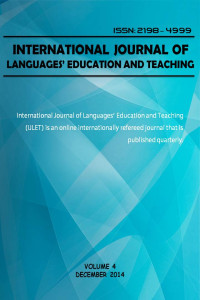Öz
Project-based learning (PBL) is based on the idea that students learn by experiencing and solving real world problems. Students, as a team, investigate a complex question, problem or challenge as an extension of what has already been learned in class in this extended process of inquiry and present a project. As it requires authentic use of language in order to communicate with group members, class mates and the teacher, PBL can be very useful in EFL (English as a Foreign Language) program if the “voice and choice” of the students are developed through carefully planned and managed instructional benchmarks. This research was conducted to investigate the opinions of the English prep school students about the Project Based Learning implementation they were involved in at the School of Foreign Languages at Selçuk University in Konya, Turkey, in 2011-2012 academic year. The case study, one of the descriptive qualitative research models, was used as a method in the study. 50 randomly selected prep class students participated in the study voluntarily. The data were gathered through face to face interviews and a semi-structured form with 6 open ended questions. The findings revealed that Project Based Learning could be used as a means to guide learners advance towards autonomous learning. It was also noteworthy that formative assessment should take place in the learning environment as involving learners in their own assessment will help them see their strengths and weaknesses.
Anahtar Kelimeler
Kaynakça
- Atkin, J.M., Black, P., and Coffey, J. E. (2001). Classroom assessment and the national science education standards. Washington, DC: National Academy Press. Bas, G. (2011). Investigating the effects of project-based learning on students’ academic achievement and attitudes towards English lesson. The online journal of new horizons in education. 1(4), 1-15.
- Beckett, G.H., and Slater, T. (2005). The project framework: A tool for language, content and skills integration. ELT Journal. 59(2), 108-116. Beckett, G.H., and Chamness Miller, P. (2006). Project-based second language and foreign language education: past, present, future. Greenwich, Connecticut: Information Age Publishing. Bender, W.N. (2012). Project besed learning: Differentiated instruction for the 21st century. Thousand Oaks, CA: Corwin Press. Black, P. (1993). Formative and summative assessment by teachers. Studies in science education. The Netherlands: Kluwer Academic Press. ), 87-104.
Öz
Proje Temelli Öğrenme öğrencilerin gerçek dünya problemlerini yaşayarak ve çözerek öğrendikleri fikrine dayanır. Proje Temelli öğrenme sürecinde öğrenciler sınıfta öğrendikleri konuların bir uzantısı olarak karmaşık bir durum, soru ya da problemi ekip arkadaşları ile birlikte araştırırlar ve buna yönelik bir projeyi sunarlar. Proje Temelli Öğrenmede, proje geliştirme süreci boyunca iletişim kurabilmek amacıyla öğrencilerin grup üyeleriyle, projelerini sunarken ise diğer öğrencilerle ve öğretmenleriyle konuşmaları gerektiği için, dikkatlice hazırlanmış ve uygulanmış yönergeler yoluyla öğrencilerin “tercihleri ve sesleri” duyulabilir ve İngilizce öğretiminde faydalı sonuçlar alınabilir. Bu çalışma Konya Selçuk Üniversitesi Yabancı Diller Yüksekokulu’nda 2011-2012 akademik yılında uygulanan Proje Temelli Öğrenme sürecine katılmış İngilizce Hazırlık sınıfı öğrencilerinin Proje Temelli Öğrenme hakkındaki görüşlerini ve düşüncelerini araştırmak amacıyla yapılmıştır. Araştırmada yöntem olarak betimsel nitel araştırma yöntemlerinden vaka araştırması kullanılmıştır. Çalışmaya tesadüfî örneklem alma yoluyla seçilmiş 50 İngilizce Hazırlık sınıfı öğrencisi gönüllü olarak katılmıştır. Veri toplama aracı olarak yarı-yapılandırılmış 6 açık uçlu sorudan oluşmuş bir form kullanılmıştır. Ayrıca yüz yüze görüşmeler vasıtasıyla da veri toplanmıştır. Araştırma bulguları Proje Temelli Öğrenmenin öğrencilerin özerk öğrenme sürecinde ilerlemelerine yardımcı olabilecek bir araç olarak kullanılabileceğini ortaya koymuştur. Ayrıca, araştırmada öğrencilerin kendi güçlü ve zayıf yönlerini görmelerine yardımcı olacak formatif değerlendirme yöntemlerinin öğrenme sürecine dâhil edilmesi gerekliliği önemli bir bulgu olarak dikkat çekmiştir.
Anahtar Kelimeler
Kaynakça
- Atkin, J.M., Black, P., and Coffey, J. E. (2001). Classroom assessment and the national science education standards. Washington, DC: National Academy Press. Bas, G. (2011). Investigating the effects of project-based learning on students’ academic achievement and attitudes towards English lesson. The online journal of new horizons in education. 1(4), 1-15.
- Beckett, G.H., and Slater, T. (2005). The project framework: A tool for language, content and skills integration. ELT Journal. 59(2), 108-116. Beckett, G.H., and Chamness Miller, P. (2006). Project-based second language and foreign language education: past, present, future. Greenwich, Connecticut: Information Age Publishing. Bender, W.N. (2012). Project besed learning: Differentiated instruction for the 21st century. Thousand Oaks, CA: Corwin Press. Black, P. (1993). Formative and summative assessment by teachers. Studies in science education. The Netherlands: Kluwer Academic Press. ), 87-104.
Ayrıntılar
| Birincil Dil | İngilizce |
|---|---|
| Konular | İkinci Bir Dil Olarak İngilizce |
| Bölüm | Araştırma Makalesi |
| Yazarlar | |
| Yayımlanma Tarihi | 30 Aralık 2014 |
| Yayımlandığı Sayı | Yıl 2014 Cilt: 2 Sayı: 3 |


